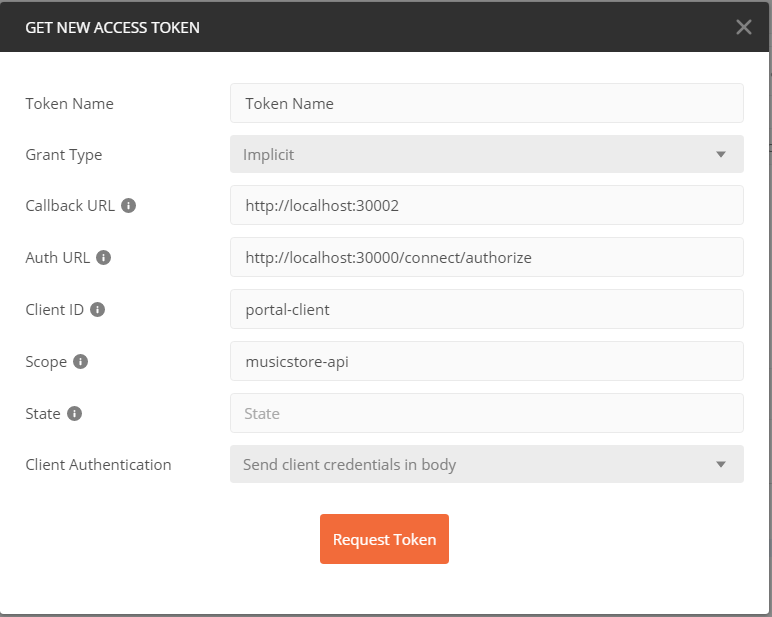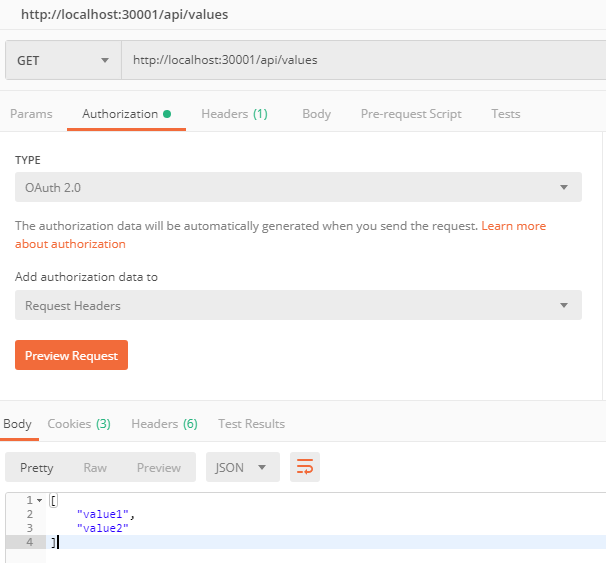MusicStore - Part2 - Link three parties
28 Feb 2019Register Client in IdentityServer
"Clients": [
{
"ClientId": "portal-client",
"ClientName": "MusicStore Portal Client",
"ClientUri": "http://localhost:30002",
"RequireConsent": false,
"AllowedGrantTypes": "implicit",
"AllowAccessTokensViaBrowser": true,
"RedirectUris": "http://localhost:30002",
"PostLogoutRedirectUris": "http://localhost:30002/loggedout",
"AllowedCorsOrigins": "http://localhost:30002",
"AllowedScopes": "openid;profile;email;musicstore-api",
"AlwaysIncludeUserClaimsInIdToken": true,
"IdentityTokenLifetime": 3600,
"AccessTokenLifetime": 3600
}
]
-
Create a new Client called “portal-client”
- ClientUri => WebUI Uri
- RequireConsent => false means disable consent dialog after login
- AllowedGrantTypes => Grant type of SPA client needs to be implicit
- RedirectUris => Redirect Uri after login, id_token will be appended
- PostLogoutRedirectUris => Redirect Uri after logging out
- AllowedCorsOrigins => WebUI Uri
- AllowedScopes => API scopes can be consumed for this client
-
Register musicstore-api
// Configuration/Resources.cs public static IEnumerable<ApiResource> GetApiResources() { return new[] { ...... new ApiResource("musicstore-api", "MusicStore API") }; }
Authenticate WebAPI from IdentityServer
- Add Authentication from IdentityServer
-
Add CORS to allow origins from WebUI
// Startup.cs public void ConfigureServices(IServiceCollection services) { services.AddMvc().SetCompatibilityVersion(CompatibilityVersion.Version_2_1); // Authenticated by IdentityServer services .AddAuthentication("Bearer") .AddIdentityServerAuthentication(options => { options.Authority = Configuration.GetValue<string>("Authority"); options.RequireHttpsMetadata = Configuration.GetValue<bool>("RequireHttpsMetadata"); options.ApiName = Configuration.GetValue<string>("ApiName"); }); // CORS Policy string strOrigionList = Configuration.GetValue<string>("AllowedOrigions"); if (!string.IsNullOrEmpty(strOrigionList)) { services.AddCors(options => { // this defines a CORS policy called "default" options.AddPolicy("default", policy => { policy.WithOrigins(strOrigionList.Split(new string[] { ";" }, StringSplitOptions.RemoveEmptyEntries)) .AllowAnyHeader() .AllowAnyMethod(); }); }); } }// Startup.cs public void Configure(IApplicationBuilder app, IHostingEnvironment env) { if (env.IsDevelopment()) { app.UseDeveloperExceptionPage(); } app.UseCors("default"); app.UseAuthentication(); app.UseMvc(); }// appsettings.Development.json { "Logging": { "LogLevel": { "Default": "Debug", "System": "Information", "Microsoft": "Information" } }, // Authentication - IdentityServer "Authority": "http://localhost:30000", "RequireHttpsMetadata": false, "ApiName": "musicstore-api", // CORS - Allow WebUI "AllowedOrigions": "http://localhost:30002" } -
Disable anonymous access to values controller
// ValuesController.cs [Authorize] [Route("api/[controller]")] [ApiController] public class ValuesController : ControllerBase { ...... } - Test from Postman
- Select “TYPE” as “OAuth 2.0” in Authorization tab
- Click “Get New Access Token”
-
Fill in the Client info and click “Request Token”

- Username / Password - bob / bob or alice / alice
-
After getting the JWT token, attach it to Header and fire “GET” request to http://localhost:30001/api/values will return [“value1”, “value2”]

Consume WebAPI from WebUI
-
Install OIDC to bridge WebUI and IdentityServer
npm install angular-oauth2-oidc@^3 --save -
Apply OIDC
- Update AppModule to include OAuthModule
@NgModule({ declarations: [ ...... ], imports: [ ...... OAuthModule.forRoot() ], providers: [ { provide: HTTP_INTERCEPTORS, useClass: TokenInterceptor, multi: true, } ] bootstrap: [AppComponent] }) export class AppModule { } -
Add AuthConfig
export const authConfig: AuthConfig = { // Url of the Identity Provider issuer: environment.identityServerUrl, // URL of the SPA to redirect the user to after login redirectUri: window.location.origin, // The SPA's id. The SPA is registerd with this id at the auth-server clientId: 'portal-client', // set the scope for the permissions the client should request // The first three are defined by OIDC. The 4th is a usecase-specific one scope: 'openid profile email ' + environment.apiScope, postLogoutRedirectUri: environment.identityServerUrl + '/account/login' } - Environment configuration
// environment.ts export const environment = { production: false, apiScope: "musicstore-api", apiUrl: 'http://localhost:30001/api/', identityServerUrl: 'http://localhost:30000' };// environment.prod.ts export const environment = { production: true, apiScope: "musicstore-api", apiUrl: 'http://api.jaycoder.net/api/', identityServerUrl: 'https://id.jaycoder.net' };ng build --env=prod -
Initialize OAuthService in AppComponent
Token will be validated in ngOnInit method, if it’s expired, initImplicitFlow will redirect to IdentityServer login to reissue a new one.
export class AppComponent { title = 'app'; constructor( @Inject(PLATFORM_ID) private platformId: Object, private _oauthService: OAuthService ) { if (isPlatformBrowser(this.platformId)) { this._oauthService.configure(authConfig); this._oauthService.tokenValidationHandler = new JwksValidationHandler(); if (!environment.production) { this._oauthService.events.subscribe(e => { console.log("oauth/oidc event", e); }); } } } /** * On init */ ngOnInit(): void { if (isPlatformBrowser(this.platformId)) { this._oauthService.loadDiscoveryDocumentAndTryLogin().then(_ => { if (!this._oauthService.hasValidIdToken() || !this._oauthService.hasValidAccessToken()) { this._oauthService.initImplicitFlow(); } else { } }); } } }
- Update AppModule to include OAuthModule
- Add a new component “Sample” to call /api/values
export class SampleComponent { public values: string[]; constructor(http: HttpClient) { var valuesApiUrl = environment.apiUrl + 'values'; http.get<string[]>(valuesApiUrl).subscribe(result => { this.values = result; }, error => console.error(error)); } } - Add TokenInterceptor to append Bearer Authorization in header
export class TokenInterceptor implements HttpInterceptor { private _authService: OAuthService; // Would like to inject authService directly but it causes a cyclic dependency error // see https://github.com/angular/angular/issues/18224 constructor(private _injector: Injector) { } intercept(request: HttpRequest<any>, next: HttpHandler): Observable<HttpEvent<any>> { if (this.getAuthService().hasValidAccessToken()) { request = request.clone({ // Remove cache in IE headers: request.headers.set('Cache-Control', 'no-cache') .set('Pragma', 'no-cache') .set('Expires', 'Sat, 01 Jan 1900 00:00:00 GMT') .set('Authorization', 'Bearer ' + this.getAuthService().getAccessToken()) }); } return next.handle(request); } getAuthService(): OAuthService { if (typeof this._authService === 'undefined') { this._authService = this._injector.get(OAuthService); } return this._authService; } }
Test




